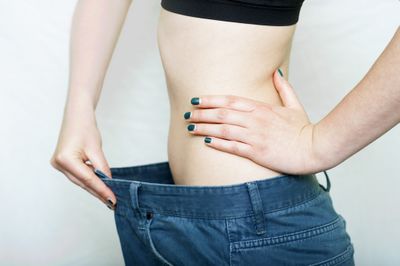Very-low-calorie diet
Very Low Calorie Diet (VLCD)[edit]
A Very Low Calorie Diet (VLCD), sometimes referred to as a starvation diet, is a diet characterized by extremely low daily food energy intake. It is typically defined as a diet that provides 800 to 1200 calories per day or less.
Definition and Overview[edit]
VLCDs are specially formulated, nutritionally complete, liquid meals containing no more than 800 kilocalories per day. These diets are designed to provide all the necessary nutrients required for a healthy daily intake, including vitamins, minerals, trace elements, fatty acids, and protein.
Composition[edit]
The composition of a VLCD can vary. Carbohydrates may be significantly reduced or entirely absent, with a corresponding increase in the proportion of protein in the diet. This adjustment in macronutrients has notable metabolic effects.
Health Considerations[edit]
VLCDs are generally used under medical supervision to ensure that the individual's nutritional and health needs are met. They are often a temporary measure for rapid weight loss in people with specific health conditions.
Benefits[edit]
- Rapid weight loss
- Improved control of conditions such as diabetes
Risks[edit]
- Potential nutrient deficiencies
- Metabolic complications
- Requires medical supervision
Indications[edit]
A VLCD is typically undertaken by an obese patient who wishes to lose a lot of weight quickly, as the risk to health that obesity presents is considered much greater than any risks of the diet itself, so long as it is undertaken with medical supervision.
Health effects[edit]
- VLCDs have been shown to be more effective than behavioral weight loss programs, achieving approximately 4 kg more weight loss at 1 year.
- Another potential side effect is constipation (depending on the fiber content of the diet).
See also[edit]
Usage in Medical Settings[edit]
VLCDs are often used in medical settings for obese patients needing rapid weight loss for specific health reasons, such as before undergoing surgery.
External Links[edit]
References[edit]
<references group="" responsive="1"></references>
|
|
|
| Human nutrition and healthy diets | ||||||||||||||||||||||
|---|---|---|---|---|---|---|---|---|---|---|---|---|---|---|---|---|---|---|---|---|---|---|
: Diet : Dieting : Cuisine : Dietitian : Hunger : Leptin : Meal : Nutrition : Obesity : Staple food
|
Tired of Being Overweight?[edit]
Achieve lasting results with W8MD's proven weight loss program, trusted by thousands since 2011. Our comprehensive approach tackles weight gain factors like insulin resistance to help you lose weight and keep it off.

Tailored Weight Loss Solutions[edit]
W8MD offers personalized weight loss plans, including FDA-approved medications and GLP-1 injections, such as:
Other options include:
We also offer nutritious, low-glycemic foods and meal replacements to keep you on track.
Convenient Locations[edit]
W8MD provides weight loss services in Brooklyn, New York and Greater Philadelphia, with tailored plans and GLP-1 weight loss injections.
Looking for a weight loss clinic in Brooklyn or weight loss doctors in NYC? W8MD's expert team is here to help.

Weight Loss Doctor in NYC[edit]
Trust W8MD's best weight loss doctors in NYC for personalized solutions, including wiki Physician Weight Loss Program and GLP-1 injections.
W8MD Weight Loss Clinic in Philadelphia[edit]
W8MD in Philadelphia offers FDA-approved medications and weight loss injections. Visit our medical weight loss clinic for expert care.
Find the best weight loss tips in Philadelphia with W8MD.
Take the First Step[edit]
Book your consultation today and start your journey:
- Visit W8MD Official Site
- Check out Yelp reviews
- Schedule via Patient Fusion
Call now for medical weight loss:
- NYC: 718-946-5500
- Philadelphia: 215-676-2334
Explore W8MD's NYC Physician Weight Loss Program now!
- Individual results may vary!
Ad. Transform your life with W8MD's Budget GLP-1 injections from $49.99


W8MD offers a medical weight loss program to lose weight in Philadelphia. Our physician-supervised medical weight loss provides:
- Weight loss injections in NYC (generic and brand names):
- Zepbound / Mounjaro, Wegovy / Ozempic, Saxenda
- Most insurances accepted or discounted self-pay rates. We will obtain insurance prior authorizations if needed.
- Generic GLP1 weight loss injections from $49.99 for the starting dose of Semaglutide and $65.00 for Tirzepatide.
- Also offer prescription weight loss medications including Phentermine, Qsymia, Diethylpropion, Contrave etc.
NYC weight loss doctor appointmentsNYC weight loss doctor appointments
Start your NYC weight loss journey today at our NYC medical weight loss and Philadelphia medical weight loss clinics.
- Call 718-946-5500 to lose weight in NYC or for medical weight loss in Philadelphia 215-676-2334.
- Tags:NYC medical weight loss, Philadelphia lose weight Zepbound NYC, Budget GLP1 weight loss injections, Wegovy Philadelphia, Wegovy NYC, Philadelphia medical weight loss, Brookly weight loss and Wegovy NYC
|
WikiMD's Wellness Encyclopedia |
| Let Food Be Thy Medicine Medicine Thy Food - Hippocrates |
Medical Disclaimer: WikiMD is not a substitute for professional medical advice. The information on WikiMD is provided as an information resource only, may be incorrect, outdated or misleading, and is not to be used or relied on for any diagnostic or treatment purposes. Please consult your health care provider before making any healthcare decisions or for guidance about a specific medical condition. WikiMD expressly disclaims responsibility, and shall have no liability, for any damages, loss, injury, or liability whatsoever suffered as a result of your reliance on the information contained in this site. By visiting this site you agree to the foregoing terms and conditions, which may from time to time be changed or supplemented by WikiMD. If you do not agree to the foregoing terms and conditions, you should not enter or use this site. See full disclaimer.
Credits:Most images are courtesy of Wikimedia commons, and templates, categories Wikipedia, licensed under CC BY SA or similar.
Translate this page: - East Asian
中文,
日本,
한국어,
South Asian
हिन्दी,
தமிழ்,
తెలుగు,
Urdu,
ಕನ್ನಡ,
Southeast Asian
Indonesian,
Vietnamese,
Thai,
မြန်မာဘာသာ,
বাংলা
European
español,
Deutsch,
français,
Greek,
português do Brasil,
polski,
română,
русский,
Nederlands,
norsk,
svenska,
suomi,
Italian
Middle Eastern & African
عربى,
Turkish,
Persian,
Hebrew,
Afrikaans,
isiZulu,
Kiswahili,
Other
Bulgarian,
Hungarian,
Czech,
Swedish,
മലയാളം,
मराठी,
ਪੰਜਾਬੀ,
ગુજરાતી,
Portuguese,
Ukrainian


